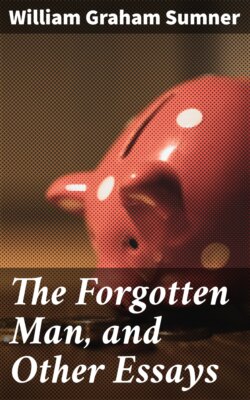Читать книгу The Forgotten Man, and Other Essays - William Graham Sumner - Страница 20
На сайте Литреса книга снята с продажи.
(F) Examination of the Proposal to Develop our Natural Resources.
Оглавление44. “But,” says the protectionist, “do you mean to say that, if we have an iron deposit in our soil, it is not wise for us to open and work it?” “You mean, no doubt,” I reply, “open and work it under protective help and stimulus; for, if there is an iron deposit, the United States does not own it. Some man owns it. If he wants to open and work it, we have nothing to do but wish him God-speed.” “Very well,” he says, “understand it that he needs protection.” Let us examine this case, then, and still we will do it assuming the truth of the protectionist doctrine. Let us see where we shall come out.
The man who has discovered iron (on the protectionist doctrine), when there is no tax, does not collect tools and laborers and go to work. He goes to Washington. He visits the statesman, and a dialogue takes place.
Iron man.—“Mr. Statesman, I have found an iron deposit on my farm.”
Statesman.—“Have you, indeed? That is good news. Our country is richer by one new natural resource than we have supposed.”
Iron man.—“Yes, and I now want to begin mining iron.”
Statesman.—“Very well, go on. We shall be glad to hear that you are prospering and getting rich.”
Iron man.—“Yes, of course. But I am now earning my living by tilling the surface of the ground, and I am afraid that I cannot make as much at mining as at farming.”
Statesman.—“That is indeed another matter. Look into that carefully and do not leave a better industry for a worse.”
Iron man.—“But I want to mine that iron. It does not seem right to leave it in the ground when we are importing iron all the time, but I cannot see as good profits in it at the present price for imported iron as I am making out of what I raise on the surface. I thought that perhaps you would put a tax on all the imported iron so that I could get more for mine. Then I could see my way to give up farming and go to mining.”
Statesman.—“You do not think what you ask. That would be authorizing you to tax your neighbors, and would be throwing on them the risk of working your mine, which you are afraid to take yourself.”
Iron man (aside).—“I have not talked the right dialect to this man. I must begin all over again. (Aloud.) Mr. Statesman, the natural resources of this continent ought to be developed. American industry must be protected. The American laborer must not be forced to compete with the pauper labor of Europe.”
Statesman.—“Now I understand you. Now you talk business. Why did you not say so before? How much tax do you want?”
The next time that a buyer of pig iron goes to market to get some, he finds that it costs thirty bushels of wheat per ton instead of twenty.
“What has happened to pig iron?” says he.
“Oh! haven’t you heard?” is the reply. “A new mine has been found down in Pennsylvania. We have got a new ‘natural resource.’”
“I haven’t got a new ‘natural resource,’” says he. “It is as bad for me as if the grasshoppers had eaten up one-third of my crop.”
45. That is just exactly the significance of a new resource on the protectionist doctrine. We had the misfortune to find emery here. At once a tax was put on it which made it cost more wheat, cotton, tobacco, petroleum, or personal services per pound than ever before. A new calamity befell us when we found the richest copper mines in the world in our territory. From that time on it cost us five (now four) cents a pound more than before. By another catastrophe we found a nickel mine—thirty cents (now fifteen) a pound tax! Up to this time we have had all the tin that we wanted above ground, because beneficent nature has refrained from putting any underground in our territory. In the metal schedule, where the metals which we unfortunately possess are taxed from forty to sixty per cent, tin alone is free. Every little while a report is started that tin has been found. Hitherto these reports have happily all proved false. It is now said that tin has been found in West Virginia and Dakotah. We have reason devoutly to hope that this may prove false, for, if it should prove true, no doubt the next thing will be forty per cent tax on tin. The mine-owners say that they want to exploit the mine. They do not. They want to make the mine an excuse to exploit the taxpayers.
46. Therefore, when the protectionist asks whether we ought not by protective taxes to force the development of our own iron mines, the answer is that, on his own doctrine, he has developed a new philosophy, hitherto unknown, by which “natural resources” become national calamities, and the more a country is endowed by nature the worse off it is. Of course, if the wise philosophy is not simply to use, with energy and prudence, all the natural opportunities which we possess, but to seek “channels favored or created by law,” then this view of natural resources is perfectly consistent with that philosophy, for it is simply saying over again that waste is the key of wealth.
